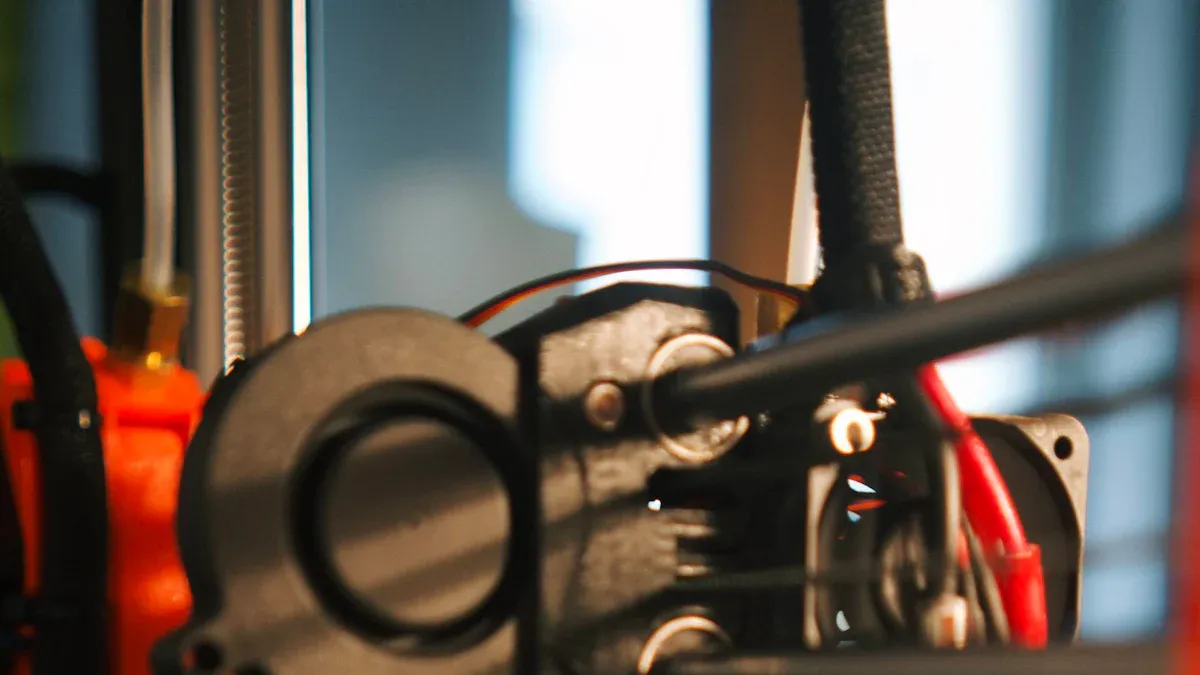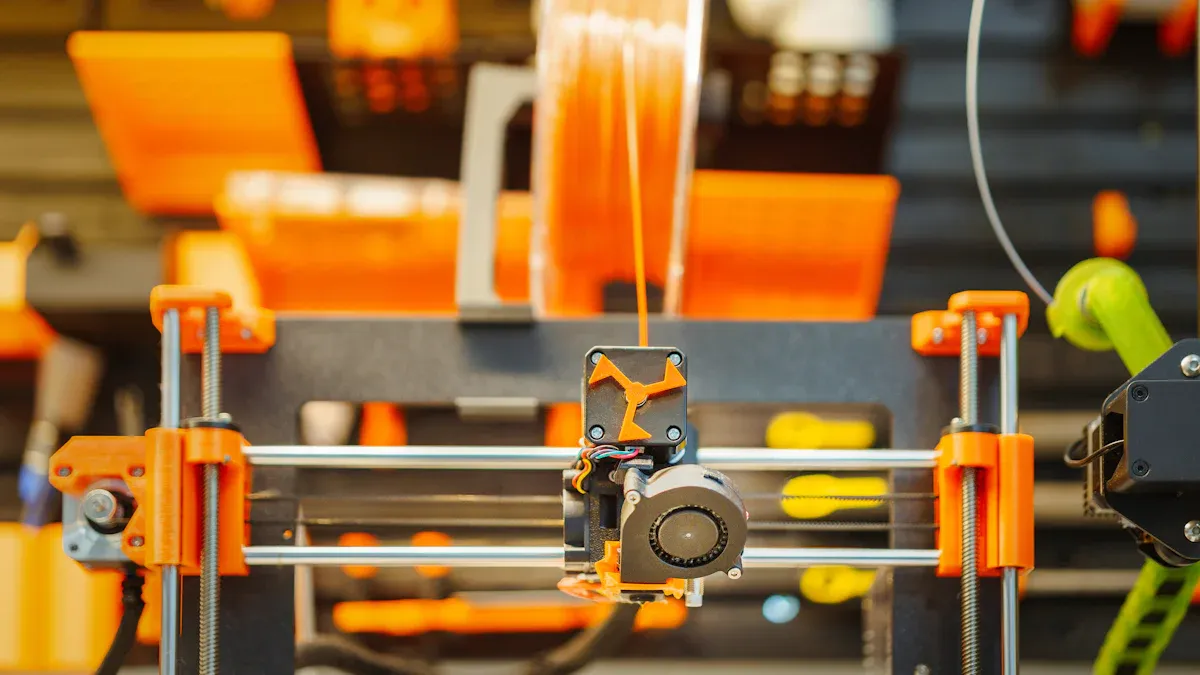
Twin screw plastic extruders are vital for sustainable plastic recycling in 2025. They enable efficient reprocessing of materials while reducing waste. Increasing focus on the circular economy and government policies drives their adoption. Parallel twin-screw extruder barrels tackle contamination challenges, while the twin screw extruder screw shaft enhances material blending for superior recycling outcomes. Additionally, the use of parallel twin screw barrels further improves the efficiency and effectiveness of the recycling process, making them an essential component in modern plastic processing technology.
Challenges in Plastic Recycling and Solutions by Twin Screw Plastic Extruders
Limitations of traditional recycling methods
Traditional recycling methods face several challenges that hinder their effectiveness. These include:
- The inability to process mixed plastics efficiently.
- Economic and technical limitations that make scaling difficult.
- High energy consumption and the production of hazardous pollutants.
- Inefficient sorting processes that lead to significant waste.
Recent studies highlight that advanced recycling methods, often marketed as environmentally friendly, fail to keep plastic in the production cycle effectively. They also struggle with restoring the mechanical properties of recycled plastics. These limitations emphasize the need for innovative solutions like the Twin Screw Plastic Extruder, which addresses these challenges with advanced technology and design.
Environmental and economic benefits of twin screw extruders
Twin Screw Plastic Extruders offer significant environmental and economic advantages. They improve the processing of recycled materials by enhancing rheology and mechanical properties. This ensures that recycled plastics meet industry standards, reducing the need for virgin materials. Additionally, these extruders manage contamination and moisture levels effectively, minimizing waste and energy consumption.
From an economic perspective, twin screw extruders enable manufacturers to process a wider range of materials, including hard-to-recycle plastics. This versatility reduces costs associated with waste disposal and raw material procurement. A study also highlights that using a twin-screw extruder with a molten resin reservoir significantly improves the elongation at break values of unsorted recycled plastics, making them more durable and marketable.
Addressing contamination and material variability
Contamination and material variability are major obstacles in plastic recycling. Twin Screw Plastic Extruders tackle these issues through their advanced design and processing capabilities. Co-rotating twin-screw extruders transform shredded materials of varying bulk densities into high-quality outputs. They incorporate additives to compensate for property loss in post-consumer materials, ensuring consistent quality.
Key parameters such as screw speed, moisture content, and feeding rate play a significant role in reducing contaminants and improving material properties. For instance, studies show that adjusting these parameters can significantly enhance the quality of recycled plastics, making them suitable for a wide range of applications. This adaptability makes twin screw extruders an essential tool for modern recycling processes.
Technology Behind Twin Screw Plastic Extruders
Key features and design advantages
Twin Screw Plastic Extruders incorporate advanced design features that enhance their performance and durability. Optimized screw designs play a pivotal role in improving throughput and product quality. By tailoring the screw configuration to specific applications, manufacturers can achieve significant efficiency gains. For instance, one extruder increased production from 3.5 tons to 8.5 tons per shift after implementing optimized screws. This approach also reduces wear by up to 50-60%, extending the lifespan of the equipment and lowering maintenance costs.
The modular design of twin screw extruders allows for flexibility in processing various materials. Adjustable parameters, such as screw speed and temperature, enable precise control over the extrusion process. This adaptability ensures consistent output quality, even when dealing with challenging materials like mixed plastics or contaminated feedstock.
Comparison with single-screw extruders
Twin screw extruders outperform single-screw extruders in several key areas. While single-screw machines rely on a single rotating element, twin screw extruders use two intermeshing screws. This configuration provides superior mixing and material conveyance. Twin screws can handle a wider range of materials, including those with high moisture content or variable bulk densities, which single screws often struggle to process effectively.
Additionally, twin screw extruders apply shear forces more evenly across the material. This reduces the risk of overheating or degradation, ensuring better preservation of material properties. Their ability to incorporate additives during processing further enhances the quality of recycled plastics, making them more suitable for high-performance applications.
Enhanced mixing and processing capabilities
The enhanced mixing and processing capabilities of twin screw extruders stem from their unique design. These machines can apply high shear in small increments, allowing for precise control over material blending. Unlike single-screw extruders, twin screws can make multiple changes in channel depth and mixing lobes, ensuring thorough homogenization of the material.
Processing tests highlight the effectiveness of these features. For example, modified barrel segments with sampling devices and multi-slit dies enable real-time flow measurement and quality monitoring. Optical detectors and LED light sources provide detailed insights into material behavior during extrusion. Studies also show that factors like screw configuration, pitch, and kneading element angle significantly influence the final product’s quality. This level of control makes twin screw extruders indispensable for modern recycling processes.
Applications of Twin Screw Plastic Extruders in Recycling

Post-industrial recycling for manufacturing waste
Twin Screw Plastic Extruders play a pivotal role in post-industrial recycling by efficiently processing manufacturing waste. These machines excel at mixing polymers with fillers, fibers, and additives, ensuring consistent material quality. Their high-speed operation, ranging from 100 to over 1000 rpm, enables intense inter-screw mixing and short mass-transfer distances. This versatility makes them ideal for continuous compounding, a critical requirement in recycling operations.
Unlike single-screw extruders, which are better suited for high-pressure applications, twin screw extruders provide superior mixing capabilities. This advantage allows manufacturers to recycle complex materials, such as reinforced plastics and polymer blends, with minimal degradation. By reducing waste and reintroducing high-quality materials into production cycles, these extruders contribute significantly to sustainable manufacturing practices.
Tip: Companies can optimize recycling efficiency by tailoring screw configurations to specific material properties, ensuring better throughput and reduced wear.
Post-consumer recycling for mixed plastics
Post-consumer recycling presents unique challenges due to the variability and contamination of mixed plastics. Twin Screw Plastic Extruders address these issues through their advanced blending and processing capabilities. Their ability to apply precise shear forces ensures thorough homogenization, even for materials with inconsistent bulk densities.
The advantages of twin screw extruders in post-consumer recycling include:
| Advantage | Description |
|---|---|
| Enhanced Mixing Capability | Superior blending and processing lead to better material uniformity. |
| Elevated Processing Efficiency | Reduced shear forces enhance recycling efficiency and maintain material quality. |
| Increased Production Output | Ability to process multiple materials simultaneously boosts overall production efficiency. |
| Augmented Operational Stability | Reduced degradation during processing ensures consistent quality and stability. |
| Precision Control | Enhanced control over processing parameters leads to improved recycling outcomes. |
These features make twin screw extruders indispensable for recycling mixed plastics, enabling manufacturers to produce high-quality outputs suitable for diverse applications. Their operational stability and precision control further ensure consistent results, reducing the reliance on virgin materials and supporting circular economy goals.
Real-world examples of successful implementations
Several industries have successfully implemented Twin Screw Plastic Extruders to enhance their recycling processes. For instance, a leading packaging company utilized twin screw extruders to recycle post-consumer polyethylene terephthalate (PET) bottles. By incorporating additives during processing, the company restored the mechanical properties of the recycled PET, making it suitable for high-performance applications like food-grade containers.
Another example involves a manufacturer of automotive components that adopted twin screw extruders to recycle post-industrial polypropylene waste. The extruders’ advanced mixing capabilities allowed the company to blend recycled polypropylene with glass fibers, creating reinforced materials with superior strength and durability.
These case studies highlight the transformative impact of twin screw extruders on recycling operations. Their ability to process diverse materials, maintain quality, and reduce waste makes them a cornerstone of sustainable plastic recycling in 2025.
Innovations in Twin Screw Plastic Extruder Technology for 2025
Emerging advancements in extruder design
Recent advancements in extruder design have revolutionized the recycling industry, making processes more efficient and sustainable. Manufacturers have introduced energy-efficient motors that reduce power consumption by up to 30%, addressing the industry’s growing demand for eco-friendly solutions. Specialized feeding systems now handle mixed plastics more effectively, ensuring consistent quality in recycled outputs.
| Innovation Type | Description |
|---|---|
| Energy Efficiency | Development of extruders with advanced motor technologies that reduce energy consumption by up to 30%. |
| Recycling Capabilities | Twin screw extruders designed for processing post-consumer plastics, enhancing recycling rates. |
| Advanced Technology Integration | Specialized feeding systems for better handling of mixed plastics, improving quality and consistency. |
These innovations highlight the industry’s commitment to sustainability while improving operational efficiency. Twin Screw Plastic Extruders, with their advanced designs, continue to set benchmarks for recycling technology in 2025.
Integration of AI and IoT for smarter recycling
The integration of artificial intelligence (AI) and the Internet of Things (IoT) has transformed recycling operations. AI-powered algorithms optimize extrusion parameters, such as temperature and screw speed, to enhance material quality. IoT-enabled sensors provide real-time data on material flow and contamination levels, enabling manufacturers to make informed adjustments during processing.
For example, IoT systems monitor energy usage and identify inefficiencies, reducing operational costs. AI-driven predictive maintenance tools also minimize downtime by detecting wear and tear in extruder components. These technologies ensure smarter recycling processes, improving both productivity and sustainability.
Contribution to circular economy goals
Twin Screw Plastic Extruders play a critical role in achieving circular economy objectives. Their ability to process diverse materials, including post-consumer and post-industrial plastics, reduces reliance on virgin resources. Advanced screw designs enable the blending of multiple polymers into customized blends, supporting the creation of durable and reusable products.
| Advancement Area | Industry Application | Key Insights |
|---|---|---|
| Compounding Extrusion | Plastics Industry | Rising demand for blending multiple materials into customized polymer blends for various applications. |
| Temperature Control | Plastics Industry | Advanced polymer blends require precise temperature control and enhanced mixing capabilities. |
By facilitating the reuse of materials and minimizing waste, these extruders contribute significantly to the circular economy. Their innovative features align with global sustainability goals, making them indispensable for modern recycling practices.
Twin screw extruders redefine sustainable recycling by enabling efficient material processing and supporting diverse applications. Their versatility in producing specialty compounds aligns with the growing demand for eco-friendly solutions. Innovations like automation and energy-efficient designs enhance their future potential. Industries can achieve sustainability goals by adopting these advanced technologies, driving progress in recycling practices.
FAQ
What makes twin screw extruders superior for recycling mixed plastics?
Twin screw extruders excel at blending materials with inconsistent densities. Their advanced mixing capabilities ensure uniformity, even for contaminated or variable feedstocks.
How do twin screw extruders contribute to sustainability goals?
They reduce reliance on virgin materials by efficiently processing post-consumer and post-industrial plastics. Their versatility supports circular economy objectives.
Can twin screw extruders handle high contamination levels?
Yes, their co-rotating screws and adjustable parameters effectively manage contaminants, ensuring high-quality recycled outputs.
Post time: Jun-04-2025
